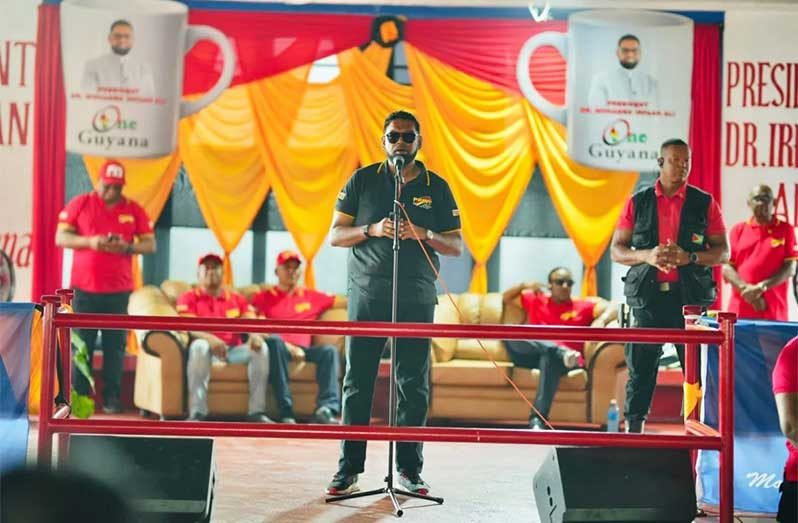AS part of the PPP/C’s ongoing commitment to transforming communities, President Dr Mohamed Irfaan Ali announced that over the next five years, resources will be allocated to transform Region Seven into a diversified economic hub.
This investment, he said, will boost the Cuyuni-Mazaruni region well beyond its traditional mining base, expanding agriculture, tourism, and other financial services.
President Ali was speaking at a packed family fun day hosted by the governing PPP/C at Tiperu Falls in Bartica, where he laid out this ambitious plan. He was accompanied by the Minister of Natural Resources, Vickram Bharrat, and former opposition Member of Parliament (MP) Jermaine Figueira, among other regional officials.
One of the key measures announced is the complete removal of taxes on all-terrain vehicles (ATVs) and outboard engines. This move will allow miners, farmers and riverine communities to afford critical equipment.
“We have already made ATVs tax-free. Outboard engines will also be tax-free. These are not luxuries, they are life and death tools for many people in these communities,” the head of state explained.
He revealed that plans are afoot to launch a scientific, integrated agricultural project on 10 acres of land right in Bartica. This undertaking will enable the town to supply mining camps and other communities with fresh fruits, vegetables, and livestock.
“That is how we’ll build a resilient, strong, diversified economy here in Region Seven. Yes, you are a mining town, but mining must not define your future,” the President stated.
A major part of the government’s plan also includes turning Bartica’s famous Regatta into a world-class tourism product. To make this a reality, the president committed to granting tax incentives and marketing support to elevate the annual event.
“Region Seven will not only be known for mining, but for tourism, entertainment, agriculture, financial and mechanical services. It will be a pillar of a diversified economy.”
The Head of State also recommitted to strengthening small and medium-scale miners, pledging to move them from “renters to owners”. He explained that the government intends to do this by integrating them into partnerships with large-scale operations, to provide access to financing, machinery, and new markets, as the country prepares to open its largest gold mine by 2027 in Region Seven.
He also highlighted Region Seven’s potential as a national supplier of quarry materials, stating that stone and aggregates from the region will be key to building the roads, highways, and bridges now under construction across Guyana.
“All the roads were going to be built from Sand Hill to Bartica, the Goshen road coming to Bartica, all the new highways going to Lethem and opening up hundreds of thousands of acres of new land must be built with our stone, made in Guyana,” he explained.
Beyond just economic diversification, the president reminded residents of the Region of ongoing social investments, including a new regional hospital, housing subsidies, youth and women’s development programmes, and a renewed push to reduce the cost of living.
As he interacted with supporters, President Ali made it clear that his government’s development strategy for the next five years is rooted in unity, love, and values essential for progress.



.jpg)








